中考英语二轮专题复习课件:定语从句(共35张PPT)
文档属性
| 名称 | 中考英语二轮专题复习课件:定语从句(共35张PPT) | 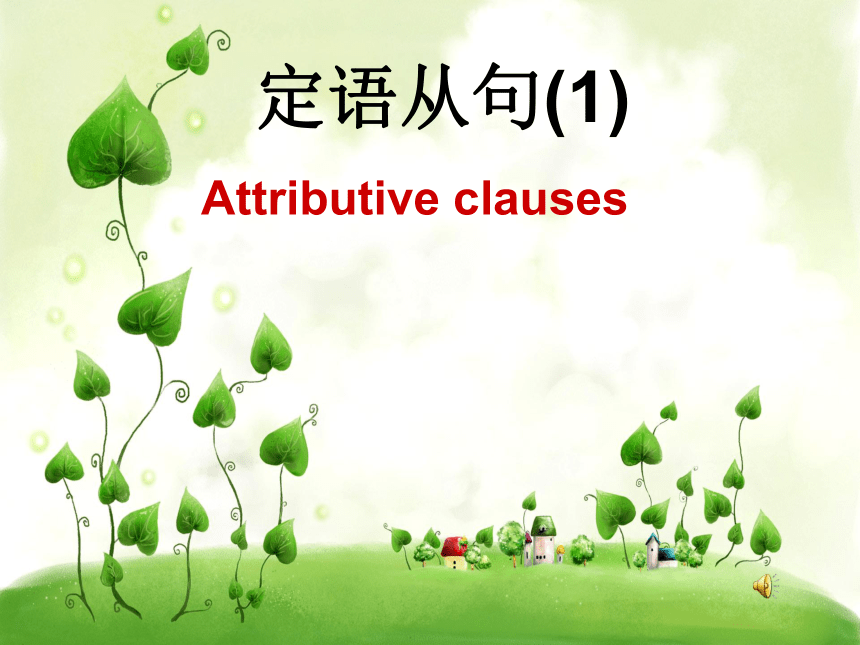 | |
| 格式 | zip | ||
| 文件大小 | 1.8MB | ||
| 资源类型 | 教案 | ||
| 版本资源 | 人教新目标(Go for it)版 | ||
| 科目 | 英语 | ||
| 更新时间 | 2018-11-19 17:10:26 | ||
图片预览

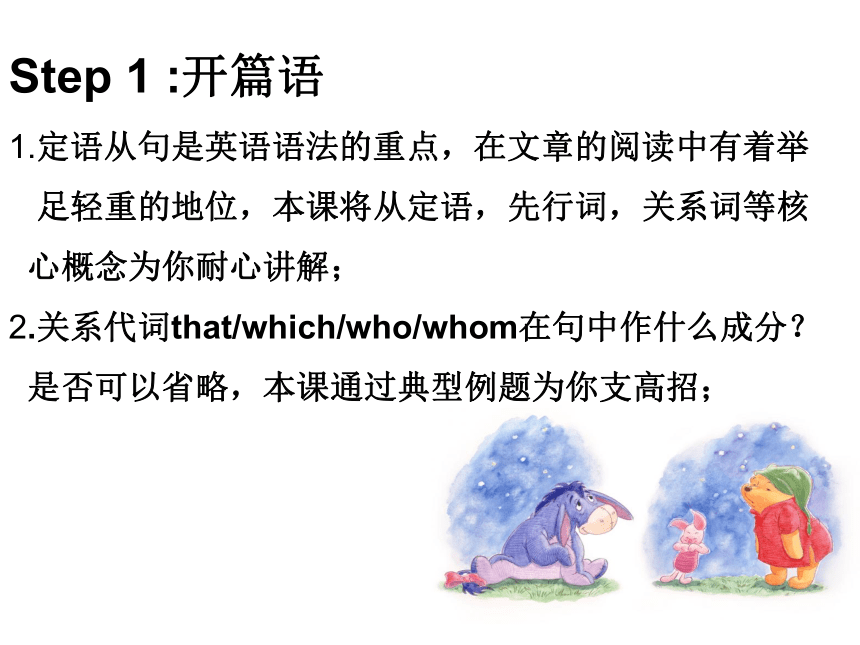
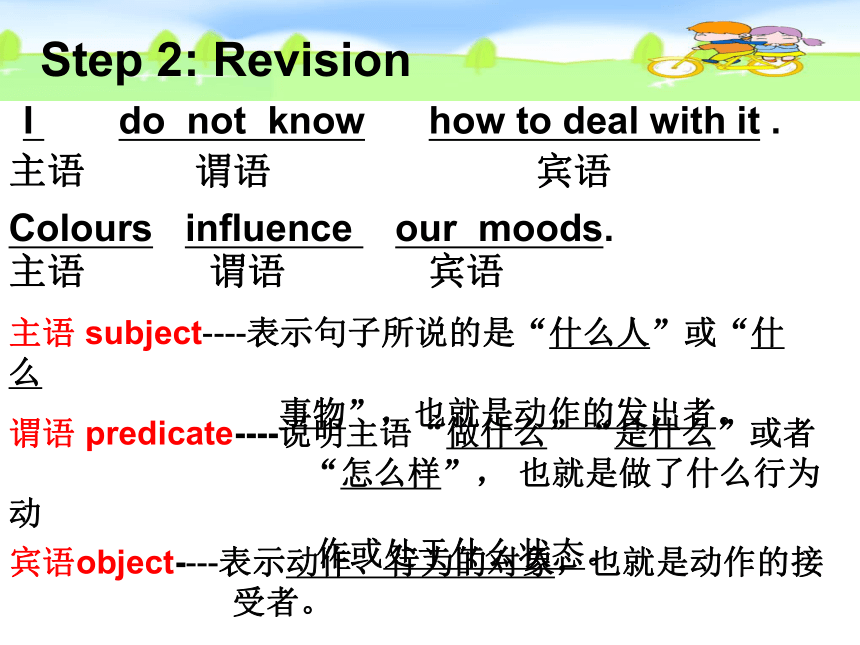
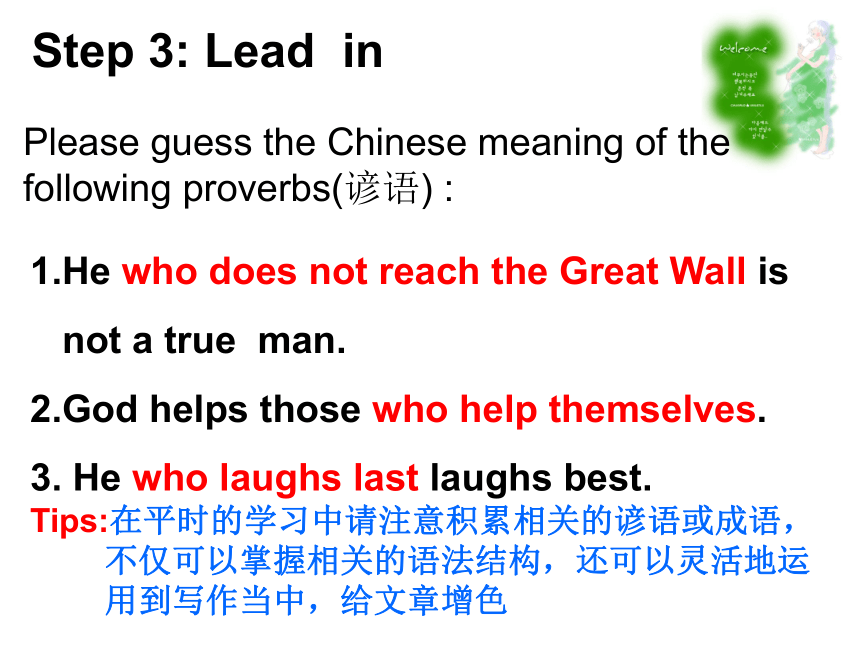
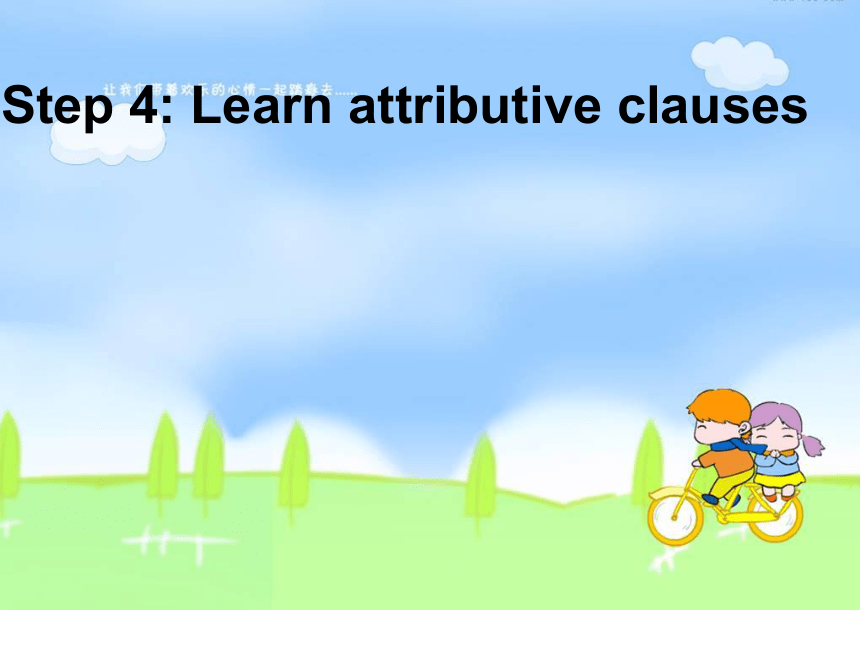
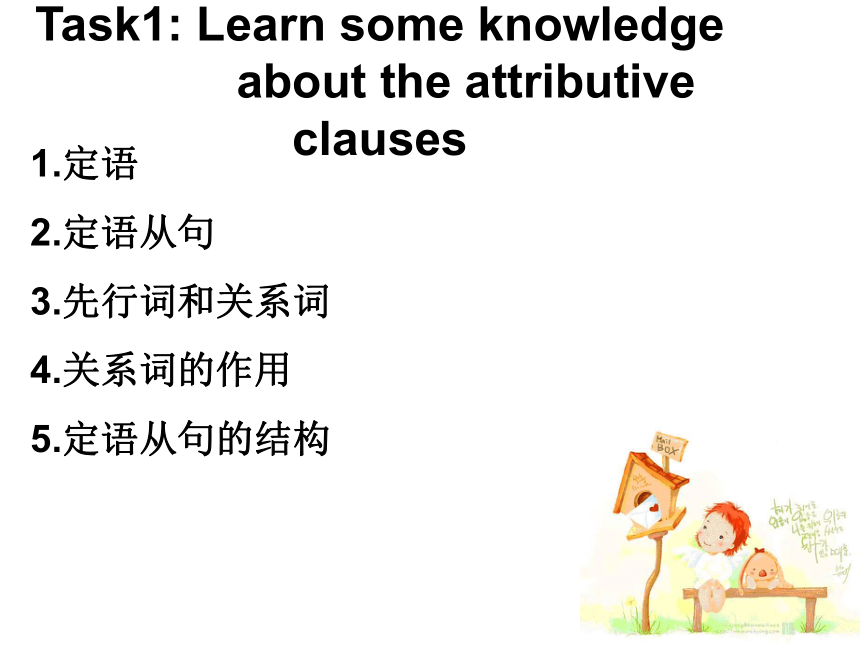
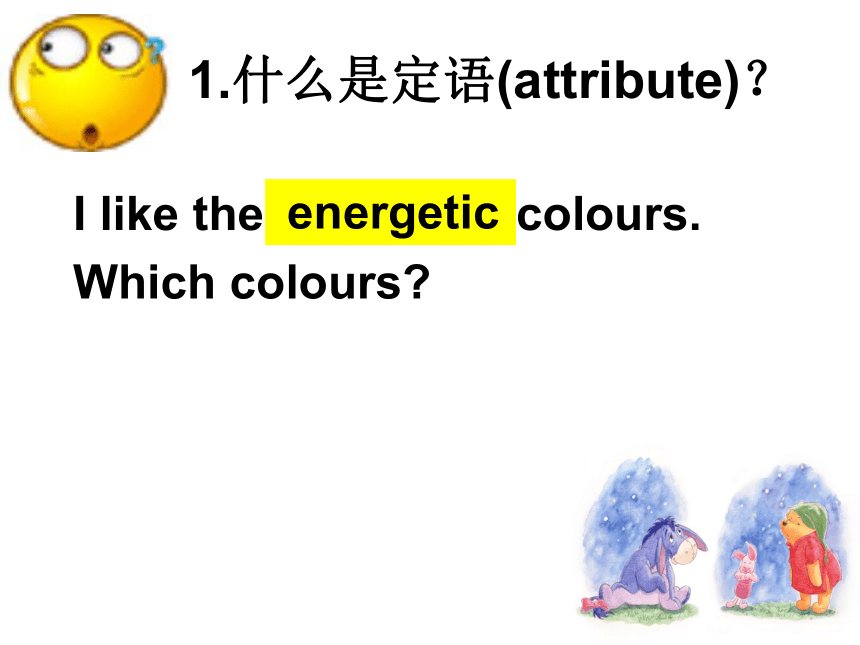
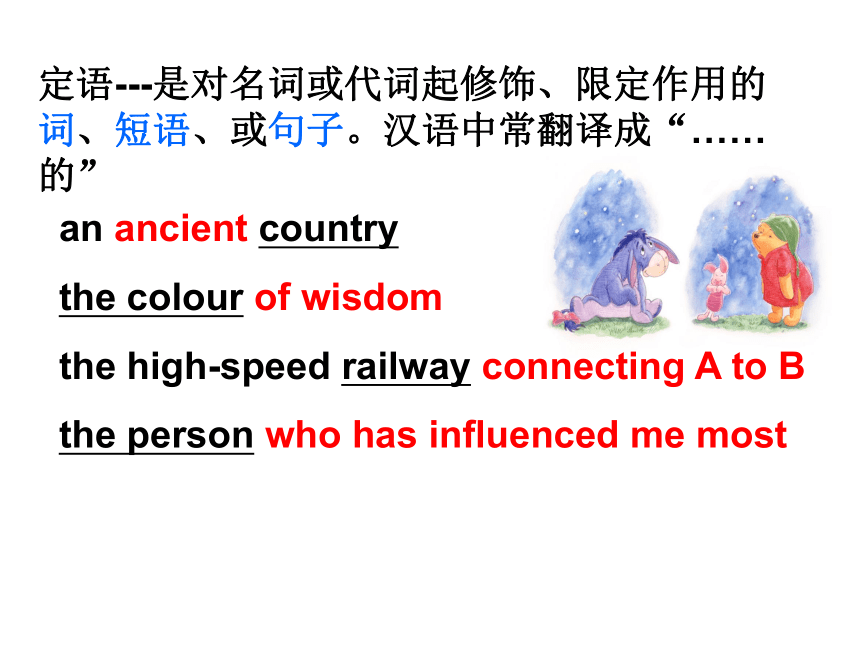
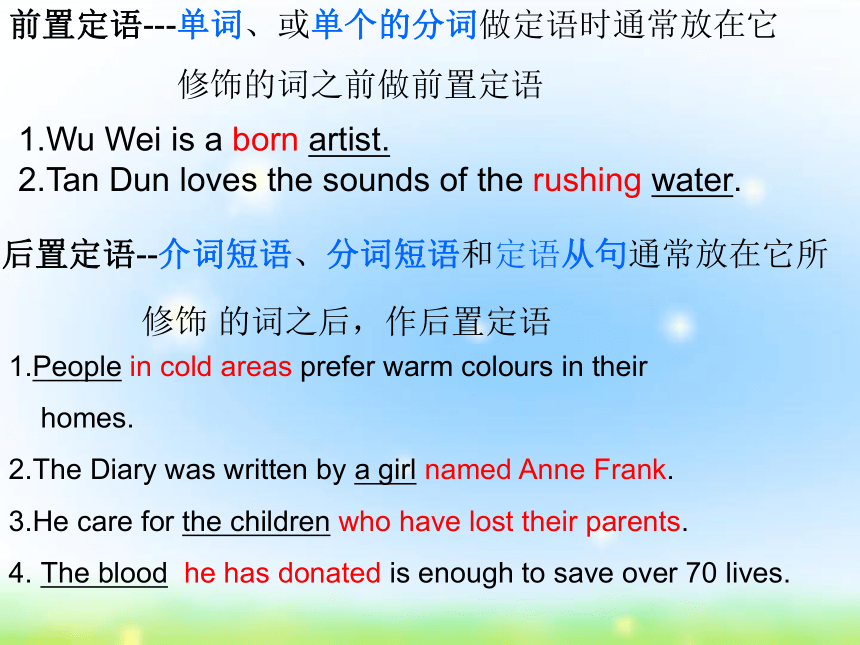
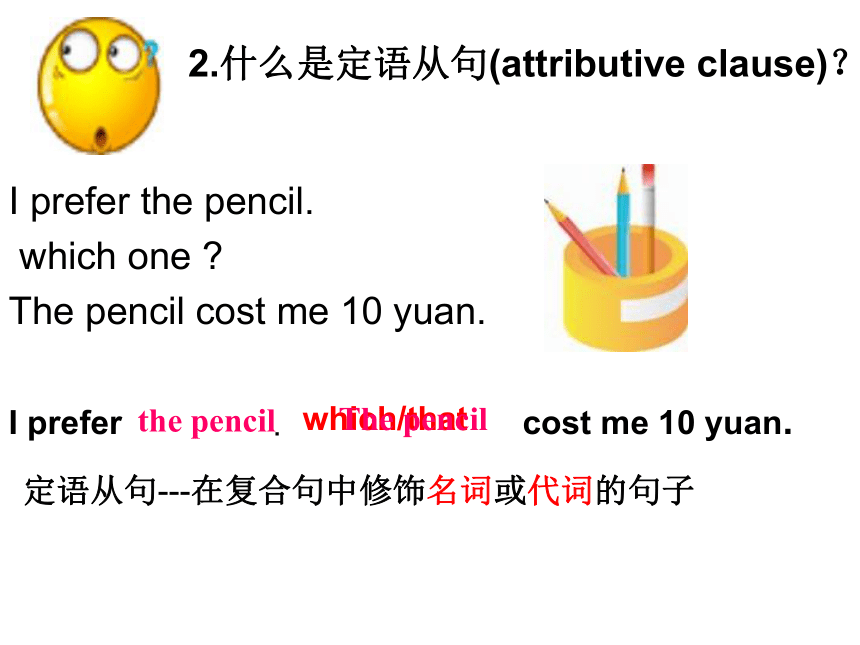
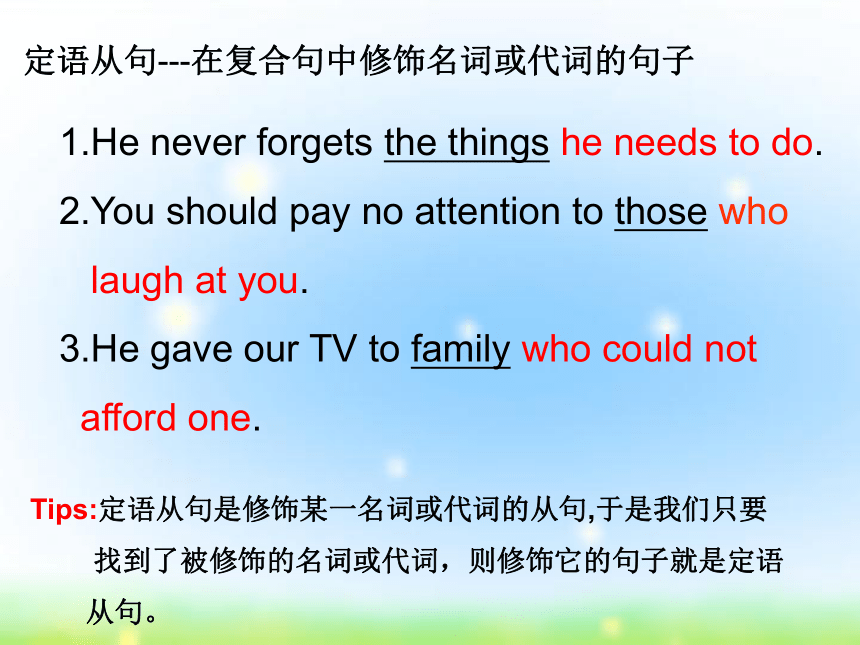
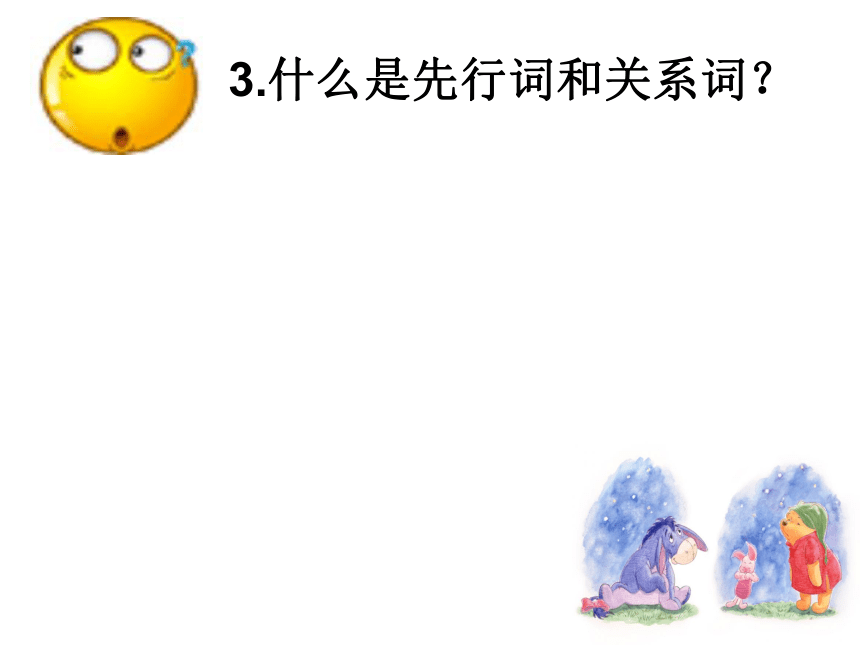
文档简介
定语从句(1)
Attributive clauses
Step 1 :开篇语
1.定语从句是英语语法的重点,在文章的阅读中有着举
足轻重的地位,本课将从定语,先行词,关系词等核
心概念为你耐心讲解;
2.关系代词that/which/who/whom在句中作什么成分?
是否可以省略,本课通过典型例题为你支高招;
Step 2: Revision
I do not know how to deal with it .
主语
谓语
宾语
主语 subject----表示句子所说的是“什么人”或“什么
事物”,也就是动作的发出者。
谓语 predicate----说明主语“做什么”“是什么”或者
“怎么样”, 也就是做了什么行为动
作或处于什么状态。
宾语object----表示动作、行为的对象,也就是动作的接
受者。
Colours influence our moods.
主语
谓语
宾语
Step 3: Lead in
Please guess the Chinese meaning of the following proverbs(谚语) :
1.He who does not reach the Great Wall is
not a true man.
2.God helps those who help themselves.
3. He who laughs last laughs best.
Tips:在平时的学习中请注意积累相关的谚语或成语,
不仅可以掌握相关的语法结构,还可以灵活地运
用到写作当中,给文章增色
Step 4: Learn attributive clauses
Task1: Learn some knowledge
about the attributive clauses
1.定语
2.定语从句
3.先行词和关系词
4.关系词的作用
5.定语从句的结构
1.什么是定语(attribute)?
I like the colours.
Which colours?
energetic
an ancient country
the colour of wisdom
the high-speed railway connecting A to B
the person who has influenced me most
定语---是对名词或代词起修饰、限定作用的词、短语、或句子。汉语中常翻译成“……的”
前置定语---单词、或单个的分词做定语时通常放在它
修饰的词之前做前置定语
1.Wu Wei is a born artist.
2.Tan Dun loves the sounds of the rushing water.
后置定语--介词短语、分词短语和定语从句通常放在它所
修饰 的词之后,作后置定语
1.People in cold areas prefer warm colours in their
homes.
2.The Diary was written by a girl named Anne Frank.
3.He care for the children who have lost their parents.
4. The blood he has donated is enough to save over 70 lives.
I prefer the pencil.
which one ?
The pencil cost me 10 yuan.
I prefer cost me 10 yuan.
which/that
The pencil
the pencil
.
.
2.什么是定语从句(attributive clause)?
定语从句---在复合句中修饰名词或代词的句子
定语从句---在复合句中修饰名词或代词的句子
1.He never forgets the things he needs to do.
2.You should pay no attention to those who
laugh at you.
3.He gave our TV to family who could not
afford one.
Tips:定语从句是修饰某一名词或代词的从句,于是我们只要
找到了被修饰的名词或代词,则修饰它的句子就是定语
从句。
3.什么是先行词和关系词?
My dad has a friend who/that is good at English.
定语从句
关系代词
who/that为关系代词,在从句中代替friend.
先行词
My dad has a friend. He is good at English.
3.先行词
——是被定语从句所修饰的词,通常是名
词或代词。
4.关系词
——是引导定语从句的关联词,
在从句中替代先行词。
注意: 从句必须紧跟在先行词后。
4. 关系词(relative pronoun) 的作用是什么呢?
a.引导定语从句;
b.代替先行词(先行词的一个替代形式);
He wrote many books. The books sold well.
--- He wrote many books which/that sold well.
c.在定语从句中担当一个成分----主语或宾语
I don’t like the man that/who is smoking.(主语)
This is the reply (that/which) I’ve just
received. (宾语)
5.定语从句的结构
….先行词(名词/代词)+关系代词(who/which/that/whom)+ ….
1.He never forgets the things that/which he
needs to do.
2.You should pay no attention to those that/who
laugh at you.
3.Do you know the teachers that/who are sitting in
our classroom now?
Task 2: How to make
a attributive clause ?
将两个句子合并成定语从句
Match the two sentences
1.I’m reading an article. The article is about Tom.
I’m reading an article that/which is about Tom.
2. She is a teacher. The teacher teaches us English.
She is a teacher that/who teaches us English.
3. Where is the coat? You bought it last week.
Where is the coat which/that you bought last week?
1.找先行词
2.换关系词
3.抄其余部分
Task 3: How to use relative pronouns?
如何使用关系代词that/which/who/whom?
which 代替事物,在从句中充当主语和宾语
1.I can’t find the letter. The letter came this morning.
2.Please give me the book. The book is about travel.
3.This is the bag. My mother bought it last week.
4. The house is made of wood. Jack built the house.
This is the bag which my mother bought last week.
I can’t find the letter which came this morning.
Please give me the book which is about travel.
The house which Jack built is made of wood.
关系代词在从句中作宾语时,可以省略,做主语时,不能省略。
/
/
that
that
that
that
/that
that代替人,在从句中充当主语和宾语。
1.The boy is called Tom. The boy broke the window.
The boy that broke the window is called Tom.
2.Mr. Li is the person. You talked with the person on the bus.
Mr. Liu is the person that you talked with on the bus.
关系代词在从句中作宾语时,可以省略。
/
who代替人.在从句中可充当 主语。
Do you know the girl?
which girl?
1.The girl is running on the grass.
2. The girl likes singing very much.
1.Do you know is running on
the grass.
2.Do you know likes singing
very much.
who
who
the girl
The girl
the girl
The girl
?
?
who / whom代替人,在从句中充当宾语。
He is the man.
I told you about him.
He is the man I told you about .
The man is a teacher.
I saw the man just now.
The man
is a teacher.
who
I saw just now
whom
the man
who
whom
him
.
Summary 关系代词的用法
√
√
√
√
√
√
√
√
√
√
√
√
×
×
×
×
How to use ‘Relative pronouns’?
何时可以省略?
做宾语时可以省略
指人 指物 主语 宾语
that
which
who
whom
小结:
that- 既可指人,也可指物,作主语,
不能省略;作宾语,可以省略。
which-指物,作主语,不能省略;作
宾语,可以省略.
who- 指人,作主语,不能省略;作宾
语,可以省略,(常用whom)
Task 4 强调特例
(1)当关系代词在定语从句中作主语时,
定语从句的谓语动词形式由先行词决定。
1.Those who against the plan put up
your hands. (be)
2.The man who next to ours sells vegetables. (live)
3.Tom is one of the students who praised
by the teacher yesterday.(be)
are
lives
were
4.Tom is the only one of the students
who praised by the teacher yesterday. (be)
was
(2)关系代词在定语从句中作宾语时可省略,作
主语则不可。
1. Did you read the book ________ I lend to you ?
A. whose B. / C. who D. what
2. Did you read the book _______was popular at
the moment.
A. that B. / C. who D. what
?
B
A
(3)关系代词有时只能用 that , 不可用 which, 初中常
见的有以下两种情况
That is the most interesting book that I have ever read.
The first thing that I should do is to review my lessons.
The man and his dog that I always meet are standing by the gate.
2.先行词同时包括人或物时
1.当先行词被形容词最高级或序数词修饰时
Task 5: Do exercises
Exercise 1:
1. The woman _____ is in red is his mother.
A. whom B. who C. whose D. which
2. We saw a film ______ was about an old story.
A. when B. who C. that D. where
3. I only eat food ______ is healthy.
A. that B. who
C. where D. whose
4. I like singers ______ different kinds of music.
A. who plays B. who play
C. who can plays D. whom plays
The boy __________ is standing under the tree is my friend Tom. He lives in a house ___________ stands on a hill. That little girl________________ Tom often helps is his sister Mary. The bird _________ is singing in the cage is Tom’s too. Bob is his dog __________ Tom and Mary often play with. The dog is great. Yesterday he caught a thief ___________running away.
Exercise 2: 用who/whom/which/that填空
who/that
which/that
who/whom/that
which/that
which/that
who/that
Exercise 3:合并为定语从句
1.This is a dream. This dream will never come true.
This is a dream that/which will never come true.
2. The dog has been found. The dog was lost.
The dog that/which was lost has been found.
3.He is a good student.Teachers are proud of him.
He is a good student that/who/whom teachers are
proud of.
Exercise 4
Try your best to find the attributive clauses in the text which we have learned this term.
老师寄语:
Nothing is too difficult to the man who’ll try.
世上无难事,只要肯登攀。
2. He who laughs last laughs best.
谁笑在最后谁最美!
Step5: Homework
1.Review what we have learned about the attributive clauses
2. Write down the attributive clauses in the
text which we have learned
Attributive clauses
Step 1 :开篇语
1.定语从句是英语语法的重点,在文章的阅读中有着举
足轻重的地位,本课将从定语,先行词,关系词等核
心概念为你耐心讲解;
2.关系代词that/which/who/whom在句中作什么成分?
是否可以省略,本课通过典型例题为你支高招;
Step 2: Revision
I do not know how to deal with it .
主语
谓语
宾语
主语 subject----表示句子所说的是“什么人”或“什么
事物”,也就是动作的发出者。
谓语 predicate----说明主语“做什么”“是什么”或者
“怎么样”, 也就是做了什么行为动
作或处于什么状态。
宾语object----表示动作、行为的对象,也就是动作的接
受者。
Colours influence our moods.
主语
谓语
宾语
Step 3: Lead in
Please guess the Chinese meaning of the following proverbs(谚语) :
1.He who does not reach the Great Wall is
not a true man.
2.God helps those who help themselves.
3. He who laughs last laughs best.
Tips:在平时的学习中请注意积累相关的谚语或成语,
不仅可以掌握相关的语法结构,还可以灵活地运
用到写作当中,给文章增色
Step 4: Learn attributive clauses
Task1: Learn some knowledge
about the attributive clauses
1.定语
2.定语从句
3.先行词和关系词
4.关系词的作用
5.定语从句的结构
1.什么是定语(attribute)?
I like the colours.
Which colours?
energetic
an ancient country
the colour of wisdom
the high-speed railway connecting A to B
the person who has influenced me most
定语---是对名词或代词起修饰、限定作用的词、短语、或句子。汉语中常翻译成“……的”
前置定语---单词、或单个的分词做定语时通常放在它
修饰的词之前做前置定语
1.Wu Wei is a born artist.
2.Tan Dun loves the sounds of the rushing water.
后置定语--介词短语、分词短语和定语从句通常放在它所
修饰 的词之后,作后置定语
1.People in cold areas prefer warm colours in their
homes.
2.The Diary was written by a girl named Anne Frank.
3.He care for the children who have lost their parents.
4. The blood he has donated is enough to save over 70 lives.
I prefer the pencil.
which one ?
The pencil cost me 10 yuan.
I prefer cost me 10 yuan.
which/that
The pencil
the pencil
.
.
2.什么是定语从句(attributive clause)?
定语从句---在复合句中修饰名词或代词的句子
定语从句---在复合句中修饰名词或代词的句子
1.He never forgets the things he needs to do.
2.You should pay no attention to those who
laugh at you.
3.He gave our TV to family who could not
afford one.
Tips:定语从句是修饰某一名词或代词的从句,于是我们只要
找到了被修饰的名词或代词,则修饰它的句子就是定语
从句。
3.什么是先行词和关系词?
My dad has a friend who/that is good at English.
定语从句
关系代词
who/that为关系代词,在从句中代替friend.
先行词
My dad has a friend. He is good at English.
3.先行词
——是被定语从句所修饰的词,通常是名
词或代词。
4.关系词
——是引导定语从句的关联词,
在从句中替代先行词。
注意: 从句必须紧跟在先行词后。
4. 关系词(relative pronoun) 的作用是什么呢?
a.引导定语从句;
b.代替先行词(先行词的一个替代形式);
He wrote many books. The books sold well.
--- He wrote many books which/that sold well.
c.在定语从句中担当一个成分----主语或宾语
I don’t like the man that/who is smoking.(主语)
This is the reply (that/which) I’ve just
received. (宾语)
5.定语从句的结构
….先行词(名词/代词)+关系代词(who/which/that/whom)+ ….
1.He never forgets the things that/which he
needs to do.
2.You should pay no attention to those that/who
laugh at you.
3.Do you know the teachers that/who are sitting in
our classroom now?
Task 2: How to make
a attributive clause ?
将两个句子合并成定语从句
Match the two sentences
1.I’m reading an article. The article is about Tom.
I’m reading an article that/which is about Tom.
2. She is a teacher. The teacher teaches us English.
She is a teacher that/who teaches us English.
3. Where is the coat? You bought it last week.
Where is the coat which/that you bought last week?
1.找先行词
2.换关系词
3.抄其余部分
Task 3: How to use relative pronouns?
如何使用关系代词that/which/who/whom?
which 代替事物,在从句中充当主语和宾语
1.I can’t find the letter. The letter came this morning.
2.Please give me the book. The book is about travel.
3.This is the bag. My mother bought it last week.
4. The house is made of wood. Jack built the house.
This is the bag which my mother bought last week.
I can’t find the letter which came this morning.
Please give me the book which is about travel.
The house which Jack built is made of wood.
关系代词在从句中作宾语时,可以省略,做主语时,不能省略。
/
/
that
that
that
that
/that
that代替人,在从句中充当主语和宾语。
1.The boy is called Tom. The boy broke the window.
The boy that broke the window is called Tom.
2.Mr. Li is the person. You talked with the person on the bus.
Mr. Liu is the person that you talked with on the bus.
关系代词在从句中作宾语时,可以省略。
/
who代替人.在从句中可充当 主语。
Do you know the girl?
which girl?
1.The girl is running on the grass.
2. The girl likes singing very much.
1.Do you know is running on
the grass.
2.Do you know likes singing
very much.
who
who
the girl
The girl
the girl
The girl
?
?
who / whom代替人,在从句中充当宾语。
He is the man.
I told you about him.
He is the man I told you about .
The man is a teacher.
I saw the man just now.
The man
is a teacher.
who
I saw just now
whom
the man
who
whom
him
.
Summary 关系代词的用法
√
√
√
√
√
√
√
√
√
√
√
√
×
×
×
×
How to use ‘Relative pronouns’?
何时可以省略?
做宾语时可以省略
指人 指物 主语 宾语
that
which
who
whom
小结:
that- 既可指人,也可指物,作主语,
不能省略;作宾语,可以省略。
which-指物,作主语,不能省略;作
宾语,可以省略.
who- 指人,作主语,不能省略;作宾
语,可以省略,(常用whom)
Task 4 强调特例
(1)当关系代词在定语从句中作主语时,
定语从句的谓语动词形式由先行词决定。
1.Those who against the plan put up
your hands. (be)
2.The man who next to ours sells vegetables. (live)
3.Tom is one of the students who praised
by the teacher yesterday.(be)
are
lives
were
4.Tom is the only one of the students
who praised by the teacher yesterday. (be)
was
(2)关系代词在定语从句中作宾语时可省略,作
主语则不可。
1. Did you read the book ________ I lend to you ?
A. whose B. / C. who D. what
2. Did you read the book _______was popular at
the moment.
A. that B. / C. who D. what
?
B
A
(3)关系代词有时只能用 that , 不可用 which, 初中常
见的有以下两种情况
That is the most interesting book that I have ever read.
The first thing that I should do is to review my lessons.
The man and his dog that I always meet are standing by the gate.
2.先行词同时包括人或物时
1.当先行词被形容词最高级或序数词修饰时
Task 5: Do exercises
Exercise 1:
1. The woman _____ is in red is his mother.
A. whom B. who C. whose D. which
2. We saw a film ______ was about an old story.
A. when B. who C. that D. where
3. I only eat food ______ is healthy.
A. that B. who
C. where D. whose
4. I like singers ______ different kinds of music.
A. who plays B. who play
C. who can plays D. whom plays
The boy __________ is standing under the tree is my friend Tom. He lives in a house ___________ stands on a hill. That little girl________________ Tom often helps is his sister Mary. The bird _________ is singing in the cage is Tom’s too. Bob is his dog __________ Tom and Mary often play with. The dog is great. Yesterday he caught a thief ___________running away.
Exercise 2: 用who/whom/which/that填空
who/that
which/that
who/whom/that
which/that
which/that
who/that
Exercise 3:合并为定语从句
1.This is a dream. This dream will never come true.
This is a dream that/which will never come true.
2. The dog has been found. The dog was lost.
The dog that/which was lost has been found.
3.He is a good student.Teachers are proud of him.
He is a good student that/who/whom teachers are
proud of.
Exercise 4
Try your best to find the attributive clauses in the text which we have learned this term.
老师寄语:
Nothing is too difficult to the man who’ll try.
世上无难事,只要肯登攀。
2. He who laughs last laughs best.
谁笑在最后谁最美!
Step5: Homework
1.Review what we have learned about the attributive clauses
2. Write down the attributive clauses in the
text which we have learned
同课章节目录
- 词法
- 名词
- 动词和动词短语
- 动词语态
- 动词时态
- 助动词和情态动词
- 非谓语动词
- 冠词
- 代词
- 数词和量词
- 形容词副词及其比较等级
- 介词和介词短语
- 连词和感叹词
- 构词法
- 相似、相近词比较
- 句法
- 陈述句
- 一般疑问句和否定疑问句
- 特殊疑问句及选择疑问句
- 反意疑问句
- 存在句(There be句型)
- 宾语从句
- 定语从句
- 状语从句
- 主谓一致问题
- 简单句
- 并列句
- 复合句
- 主谓一致
- 主、表语从句
- 名词性从句
- 直接引语和间接引语
- 虚拟语气
- 感叹句
- 强调句
- 倒装句
- 祈使句
- 句子的成分
- 句子的分类
- 题型专区
- 单项选择部分
- 易错题
- 完形填空
- 阅读理解
- 词汇练习
- 听说训练
- 句型转换
- 补全对话
- 短文改错
- 翻译
- 书面表达
- 任务型阅读
- 语法填空
- 其他资料
